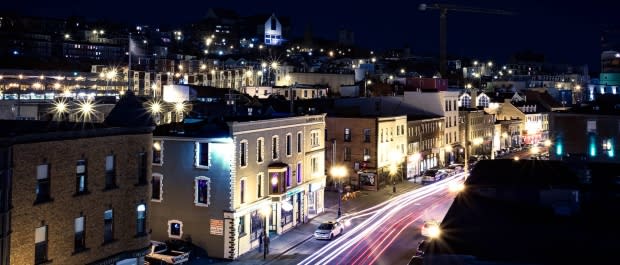St. John's business tax hike will cost jobs, warns downtown bar owner
St. John's businesses were caught off-guard by a hike in the commercial tax rate announced Monday in the 2019 budget, and one owner says the increase is going to put people out of work.
With a 1.72 per cent increase to the average commercial assessment, and the mill rate going from 24.7 to 26.1 mills — a 5.7 per cent increase — the average business owner's tax bill is going up $3,500 a year, Vaughn Hammond, the Newfoundland and Labrador director of the Canadian Federation of Independent Business, told CBC's St. John's Morning Show.
"That's on top of the 2016 increase that they experienced, and then of course all the other additional costs," he said. The 2016 mill rate was actually cut, from 26.2 to 25.2 mills, but a steep increase in assessed values meant the average commercial tax bill soared 21.2 per cent that year.
"What happened on Monday is just taking people by surprise … and now they're trying to figure out what to do and how they're going to pay for that, and where the money's going to come from to do it," said Hammond.
Big dig causing headaches for business
Brenda O'Reilly, co-owner of YellowBelly Brewery and O'Reilly's in downtown St. John's, is one of those surprised business owners. The assessed value for YellowBelly went up eight per cent, meaning about $4,500 in extra taxes in 2019.
O'Reilly said the tax hike is especially troubling with the city disrupting downtown businesses with multi-year infrastructure work that rendered some downtown streets inaccessible by car for weeks at a time.
"I know the infrastructure work needs to be done, but I saw how devastating it was to Shamrock City and Subway and other businesses in that part of Water Street," she said.
"Next year, this summer, it's going to be in front of YellowBelly. And yet my assessment went up when my sales are coming down."

O'Reilly said she's disappointed the City of St. John's is raising taxes rather than cutting spending, and Hammond said the city should look at duplication of services.
"If they wanted to, they could have identified the services that they're offering that are being offered by, say, the provincial government, for instance, whether it is housing or whether it is assessments," he said.
"That's where we said you should focus and you can find potential savings. But ultimately the council decided that they didn't want to do that, and the result that you see is a tax increase that is primarily being borne by the commercial taxpayer."

The bottom line, said O'Reilly, is that the city's tax hike will hurt employment. The food service industry is especially price sensitive, she said, because customers know they can stay at home to eat and drink rather than go to a restaurant or a bar.
"It's going to come down to less jobs. That's what it really comes down to at the end of the day for us, because the overhead is such that you can only cut on the things that you can control, which is the amount of people that you hire and employ," she said.
"I don't think the City of John's … gets small business and the importance in the economy. Right now we're employing over 200 people between all of my businesses, but we're just barely making it. It's crazy."
Read more articles from CBC Newfoundland and Labrador

